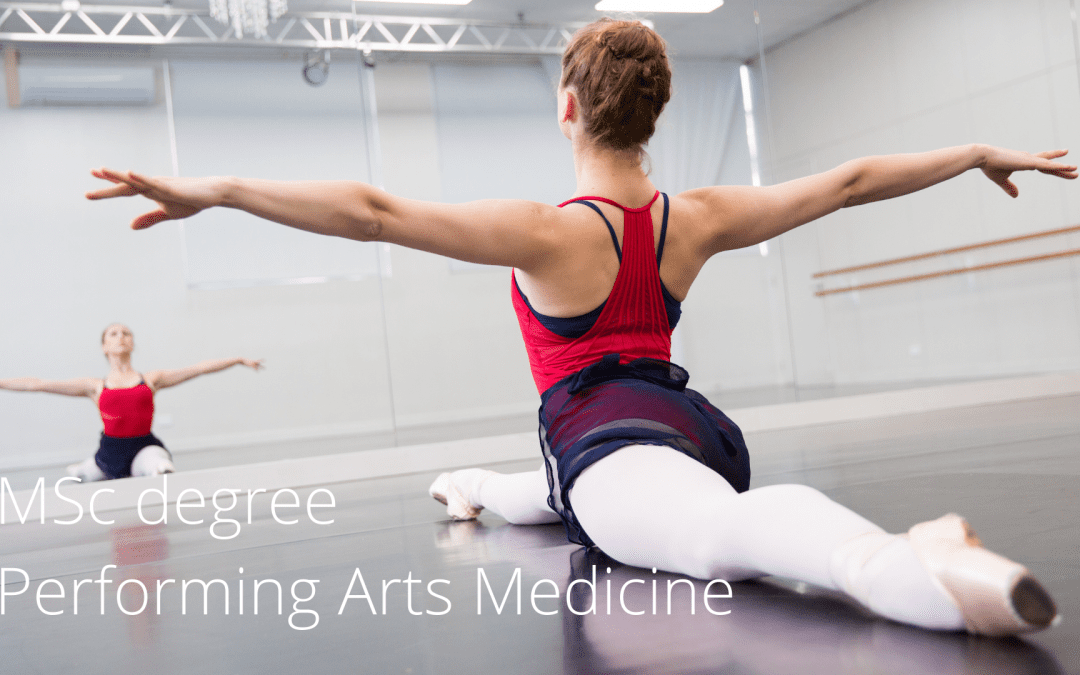PhD candidate, lecturer and trained actor, Julia Grieshofer, researches actors’ mental health at UCL. From June 2021/22, she joins the UCL MSc in Performing Arts Medicine team to lead the Psychology module on this programme, which over the past 10 years has grown into a vital hub for practitioner training, research and development in this fascinating specialism.
Here, she tells us more about the course, why it is needed and what participants can expect:
I often think that as a doctor, psychologist or general health practitioner, simply having clinical training limits our ability to attend to the specific needs of artists.
Having personal experience of the performing arts lifestyle or clinical training of common health issues within the performing arts results in a more holistic vision of clinical and mental health issues in performers. People who work in the performing arts have particular health needs that benefit from career-specific management. Healthcare practitioners who are familiar with these factors can successfully work with patients to identify what is causing issues, and plan how to recover from or, ideally, prevent injury or illness and maintain optimal health throughout a sustainable creative career.
With their experience delivering expert health and wellbeing services in the sector, BAPAM was a key partner in the establishment of the MSc programme at University College London to train more practitioners in this unique area of interest.
The MSc in Performing Arts Medicine
The program delivers specialised training to those health professionals who are already working within the health services or educational sector, to provide a more in-depth knowledge of instrumental musicians, singers, dancers, actors, circus artists and other creative professionals’ specific needs.
Different pathways
Three different pathways are available that students may choose from: a Master’s degree (MSc) which requires the completion of eight modules as well as a dissertation at the end of the course, a Post Graduate Diploma (PGDip) that allows for attendance of all eight modules without writing a dissertation or a Post Graduate Certificate (PGCert) where attendees follow a selection of four modules on the course.
Personal Experience
As a PhD candidate at UCL I attended two modules of the programme as well as lecturing on one of them. This has given me an insight into the programme and in this blog, I share my personal experience:
Excellent teaching
I was immediately impressed with the depth of experience that the speakers and lecturers on the programme brought into each session. Subjects were presented by a wide range of specialists, adopting a conference style and encouraging discussion between peers.
Most of the speakers were professionals working with patients either privately, in the NHS or through BAPAM, and could give valid practical insight into best practice in supporting performance health. One of these practitioners is, for instance, the Osteopath Lazarus Nono who works as a clinician for BAPAM.
In addition to that, academics within UCL and other institution were invited to speak about their specific field of interest adding valid theoretical content to the program. For instance, Dr Jane Oakland, lectured on the Psychology Module presenting her own research at UCL on identity issues in performers. Overall, the mixture of lecturers was excellent and provided a great combination of theoretical and practical knowledge.
Integration into the Performing Arts Medicine community
Course leader, Dr Hara Trouli, and all of the module leaders were extraordinarily welcoming and supportive. Dr Trouli is dedicated to fostering a sense of community among MSc graduates, professionals and current students by hosting frequent alumni events, discussions and encouraging graduates of the programme to return as lecturers. This is an excellent support for the development of our performing arts health network and gave students an idea of potential future career paths.
The support of BAPAM as a partner in research projects, clinic observations and development is also central, and many alumni have gone on to work closely with BAPAM. Hara and the MSc team supported my success as a student within the programme and worked towards integrating me in the performing arts community to help my advancing career.
As such, amongst others, I recently was invited to speak at a webinar at BAPAM on Perfectionism and will be leading the Psychology module on the MSc of Performing Arts Medicine with the start of the next academic year.
High quality content delivered flexibly online
Lastly, in terms of the structure of the program, the team successfully changed the programme delivery to online at short notice in 2020/21. While previous teaching was situated within the Institute of Sport, Exercise & Health, UCL now uses the platform Moodle where video recordings of lectures and study materials are uploaded every week. This format will stay in place also in the future which makes it more accessible to international students and thus I hope to see a broad audience within the classroom next year!
If you have any questions about the program or are interested to find out more consider attending the upcoming open day on the 25th of May 2021 from 3.00 to 5.00 pm on Zoom.
I look forward to seeing everyone there!

